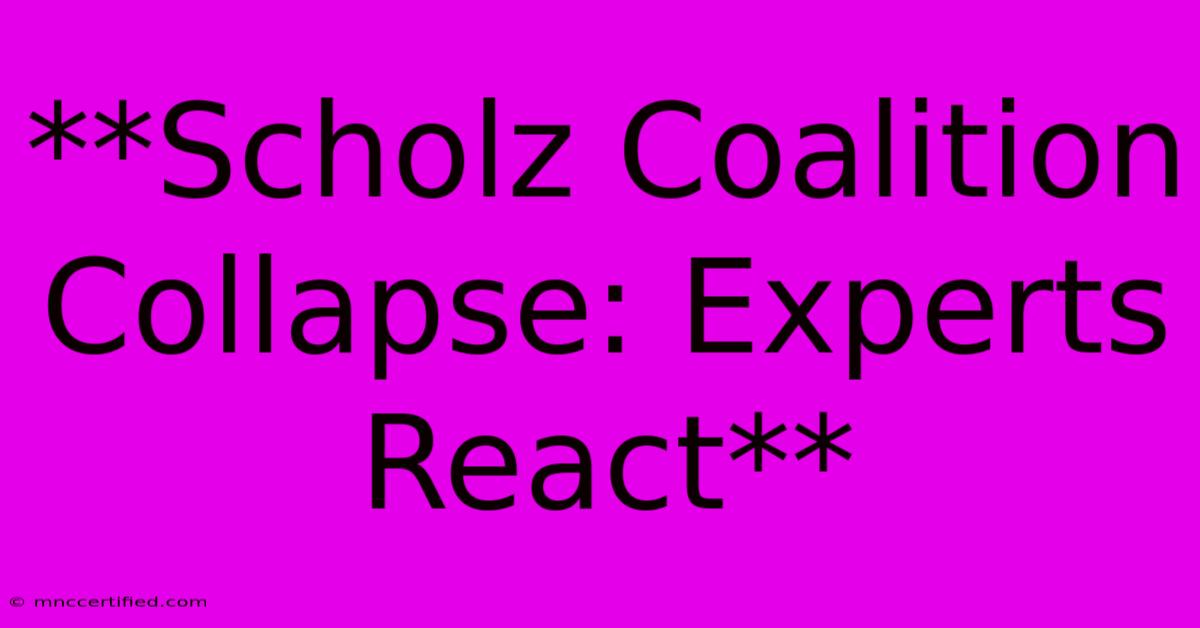**Scholz Coalition Collapse: Experts React**

Table of Contents
Scholz Coalition Collapse: Experts React
The recent turmoil within the German government has sent shockwaves through the political landscape, with experts scrambling to analyze the potential ramifications of a potential coalition collapse. While the future remains uncertain, one thing is clear: the stability of the German political system is facing its most significant test in years.
A Fragile Alliance Crumbles
The current coalition government, led by Chancellor Olaf Scholz, comprises the Social Democratic Party (SPD), the Greens, and the Free Democratic Party (FDP). The coalition, formed in December 2021, has been grappling with internal tensions over a range of issues, including climate policy, defense spending, and economic reforms. The recent crisis, however, appears to have been triggered by disagreements over the contentious issue of housing affordability.
The FDP, advocating for deregulation of the housing market, clashed with the SPD and Greens, who are pushing for stricter rent controls and increased social housing. This fundamental disagreement has exposed the deep-seated ideological differences within the coalition, raising concerns about its ability to function effectively.
Expert Opinions on the Crisis
Political analysts are divided on the likelihood of the coalition collapsing. Some believe that the current disagreements are surmountable, and that compromise will eventually prevail. They point to the historical record of German coalition governments, which have often navigated similar challenges. Others, however, are more pessimistic. They argue that the ideological chasm within the coalition is too wide to bridge, and that the recent crisis marks a breaking point.
Dr. Anna Schmidt, a political scientist at the University of Berlin, argues that "the current crisis is a reflection of the deep-seated societal divisions in Germany. The coalition partners are struggling to find common ground on a range of crucial issues. The future of the coalition hinges on their ability to address these underlying tensions."
Professor Thomas Weber, an expert in German politics at the University of Munich, warns that "a coalition collapse would have profound implications for Germany and Europe. It would lead to political instability at a time when the country is facing multiple challenges, including the war in Ukraine and the ongoing energy crisis."
Potential Scenarios and Consequences
If the coalition collapses, Germany would be forced to hold new elections. This would likely lead to a period of political uncertainty and instability. It would also complicate Germany's ability to respond to the ongoing challenges it faces, both domestically and internationally.
Even if the coalition survives, the recent crisis has exposed its fragility. This could undermine the government's ability to implement key policies and reforms. It could also lead to further gridlock and stagnation.
Looking Ahead
The future of the Scholz coalition remains uncertain. However, one thing is clear: the current crisis has highlighted the challenges facing German politics. The ability of the coalition partners to find common ground will be crucial to maintaining political stability and ensuring the effective governance of Germany in the years to come.
The crisis has also underscored the importance of public engagement in political decision-making. Citizens must hold their elected officials accountable and demand solutions to the pressing issues facing Germany.
This is a story that will continue to unfold in the coming weeks and months. The German people will be closely watching to see how the crisis unfolds and what the ultimate consequences will be for their country.

Thank you for visiting our website wich cover about **Scholz Coalition Collapse: Experts React** . We hope the information provided has been useful to you. Feel free to contact us if you have any questions or need further assistance. See you next time and dont miss to bookmark.
Featured Posts
-
Us Coastal Property And Casualty Insurance
Nov 08, 2024
-
Osimhen Inspired Napoli Defeats 10 Man Tottenham
Nov 08, 2024
-
North Korean Troops In Russia Access Porn
Nov 08, 2024
-
Galatasaray Vs Tottenham Live Stream 11 6 24
Nov 08, 2024
-
M6 Fully Reopens Following Fatal Crash
Nov 08, 2024